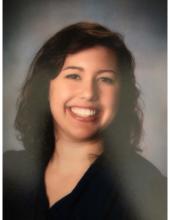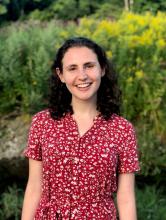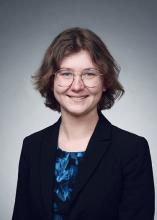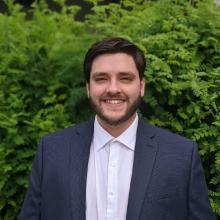Launching a Career with the Postgraduate Public Interest Fellowship Program
From Anchorage to Chicago to Boston, six recent alumni of the University of Chicago Law School will launch their careers this fall by pursuing public interest projects made possible by $50,000 fellowship grants awarded by the University of Chicago Law School.
Every year, the Law School awards Postgraduate Public Interest Law Fellowships to graduating JD students who develop public interest projects with public sector host organizations. The awards, made possible by alumni funders, are part of a suite of programming that supports students entering public service jobs after graduation.
Since the program began, 54 graduates have completed fellowships, and 98 percent have remained in public service, with 28 remaining with their host agencies.
This summer, as they prepared to begin their fellowships, several of the 2022-2023 recipients took a few moments to discuss their projects, what drew them to the work, and how their experiences at the Law School helped prepare them for careers in public service. Also participating in the fellowship is Jess Clay, ’22, who is working for the United States Senate Judiciary Committee in the Office of Senator Cory Booker.
Hannah Abrahams
Ascend Justice
Chicago, Illinois
1. What drew you to this organization? Ascend Justice is a nonprofit organization that works diligently to advocate for and support those affected by gender-based violence. I had the pleasure of volunteering with Ascend Justice as an intern my 2L summer, and jumped at the opportunity to continue working as a Staff Attorney Fellow.
2. What do you hope to learn and accomplish in the coming year? I aim to improve my advocacy skills and provide much-needed support to my community.
3. How did your time at the Law School help prepare you? The Law School helped to prepare me by emphasizing the importance of looking at the legal issue from many sides and to formulate the best arguments to further the interests of the client.
4. What is one piece of advice you have for law students—or future law students—interested in pursuing a career in public interest law? I suggest getting involved early on—go to the public interest events and get to know the clinical professors.
Sarah Cohen
Greater Boston Legal Services
Boston, Massachusetts
1. What drew you to this organization?
I really wanted to work somewhere that combined direct client services with big picture impact litigation. GBLS was the perfect fit because they occupy both worlds at once. I’ll be assisting their family law attorneys on divorce and child custody cases while also researching strategies to expand access to justice for pro se litigants in probate and family court.
2. What do you hope to learn and accomplish in the coming year?
My long-term dream is to become a law professor, and I’m mainly interested in very abstract questions about the philosophical foundations of law and the state. So I’m excited to spend next year doing pretty much the opposite of what I do in my academic work: helping people find solutions to very urgent and concrete problems—which is what law, ideally, is all about anyway.
3. How did your time at the Law School help prepare you?
At every step of the way, my professors at the Law School pushed me to grow as a thinker and advocate. When I took Con Law VII: Parent, Child, and State with Professor Emily Buss, I became quite skeptical about the idea that parents have a constitutional right to “direct and control” the upbringing of their children. Professor Buss suggested that I should spend some time representing parents in court and see if that made me change my mind. Challenge accepted!
4. What is one piece of advice you have for law students—or future law students—interested in pursuing a career in public interest law?
I am not a patient person by nature, but I do think patience is essential for the public interest job search. There will be long stretches of time when you simply have no idea what the immediate future holds, and you just have to make peace with that reality and have a little faith. Also: it helps to talk about your career path with family and friends who are not plugged into the legal profession. They won’t understand any of the things that people in law school obsess over, so they’ll help you stay in touch with what matters the most to you.
Alexandra Hale
Ocean Conservancy
Anchorage, Alaska
1. What drew you to this organization?
Clichéd answer though it may be, definitely the people! My environmental clinic professors connected me with Mike LeVine, my supervisor at OC, and what was supposed to be a brief, 15-minute chat turned into over an hour discussing the intricacies of tribal and fishery laws in Alaska. It was gratifying to meet someone who immediately understood my goals, and who will be able to teach me so much about the fields I hope to pursue.
2. What do you hope to learn and accomplish in the coming year?
I hope to work on issues of tribal and environmental law going forward, and this fellowship is a perfect opportunity to understand the work being done in those fields as well as the areas where the most additional work is needed. I am especially quite excited to work directly with OC’s tribal partners in the arctic regions of Alaska to better understand and hopefully assist in the climate mitigation strategies these communities are developing.
3. How did your time at the Law School help prepare you?
My work in the Abram’s Environmental Clinic especially taught me to translate what we were learning in class to concrete, on-the-ground legal practice, and I felt better prepared for summer jobs and this fellowship because of that hands-on experience. I also loved the freedom we had in 2L and 3L to develop our own curricula, and I was able to combine a few seminars across the Midway concerning climate policy with an environmental- and tribal-heavy legal course load.
4. What is one piece of advice you have for law students—or future law students—interested in pursuing a career in public interest law?
Clinics, clinics, clinics! I cannot fully express how helpful clinic experience has been moving forward into a career in public interest law, and the professors running the clinics are all absolutely wonderful at forging connections and helping their students figure out what aspect of the law they hope to pursue.
Daniel Lastres
First Defense Legal Aid
Chicago, Illinois
1. What drew you to this organization?
While working at the Westside Justice Center in Chicago, I decided to learn more about the other firms and organizations based there and was impressed with FDLA's history of advocacy. Around the same time, I mentioned being a law student at a comedy show, and a friendly attorney offered me his card. When I interviewed with FDLA the following year, it turned out that the attorney was my interviewer, and now I will be working under his guidance for the next year!
2. What do you hope to learn and accomplish in the coming year?
I hope to familiarize myself with the practical work of advocating and litigating for clients while exploring new routes to system-level change in our criminal legal system.
3. How did your time at the Law School help prepare you?
Working in the Civil Rights and Police Accountability Clinic gave me an opportunity to engage with the wide swath of police accountability and civil rights groups in Chicago. It gave me the research, advocacy, and engagement skills that are essential to supporting clients and pushing for meaningful change.
4. What is one piece of advice you have for law students—or future law students—interested in pursuing a career in public interest law?
Get in the habit of checking and applying for internships, grants, and fellowships on a regular basis. There are lots of opportunities out there and making the hunt for them routine will ensure that you don't miss the right ones for you.
Victoria Rose
John Howard Association
Chicago, Illinois
1. What drew you to this organization?
I deeply admire the mission of the John Howard Association to protect the rights of the incarcerated and fight against the inhumanities of our prison system. I hope that one day we can abolish the prison industrial complex entirely, but in the meantime, we need to ensure that those trapped inside the system are treated with the basic decency that every person deserves. The John Howard Association takes a very thoughtful approach to advocating for prisoner's rights, consistently centering the voices of the communities most affected by the prison industrial complex.
2. What do you hope to learn and accomplish in the coming year?
I hope to learn more about the complexities of our prison system and better understand the issues people in prison experience. Through this deeper knowledge, I hope to become a better advocate for the incarcerated and their communities. Learning about the flaws of our system in a classroom is one thing, but I believe working with the incarcerated on a regular basis will further my understanding of how our system does and does not work.
3. How did your time at the Law School help prepare you?
My time working with the Exoneration Project really helped to illuminate the many flaws in our criminal legal system and furthered my interest in pursuing a public interest career. Several of my classes, such as Mass Incarceration and Reform and The New Abolitionists, gave me the opportunity to hear the insights of leaders in the abolitionist movement and develop my own views on the issue of abolition and reform.
4. What is one piece of advice you have for law students—or future law students—interested in pursuing a career in public interest law?
Take care of yourself! A lot of people in the public interest field experience burn out because they care so deeply about their cause. Even if you have a deep personal connection to your work, it's important to step back and make time for yourself so that you can better serve others.



